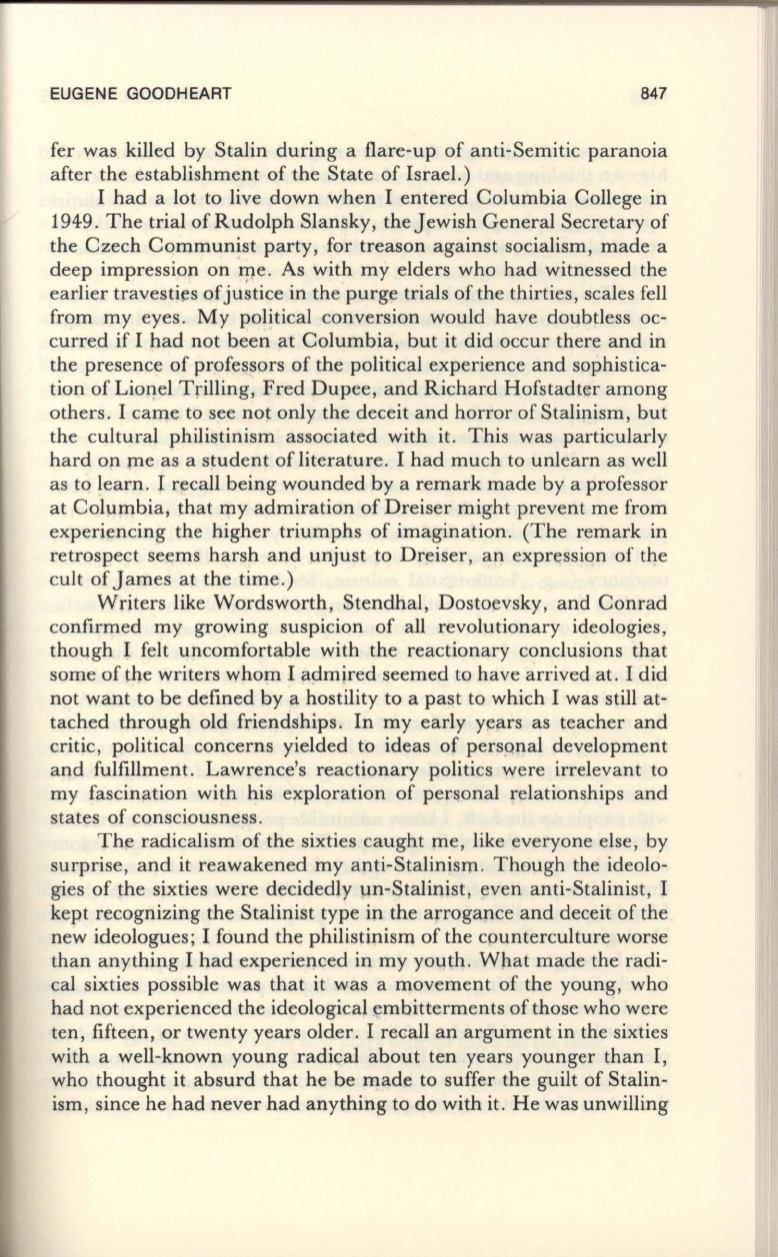
EUGENE GOODHEART
847
fer was killed by Stalin during a flare-up of anti-Semitic paranoia
after the establishment of the State of Israel.)
I had a lot to live down when I entered Columbia College in
1949. The trial of Rudolph Slansky, the Jewish General Secretary of
the Czech Communist party, for treason against socialism, made a
deep impression on me. As with my elders who had witnessed the
earlier travesties of
ju~tice
in the purge trials of the thirties, scales fell
from my eyes. My political conversion would have doubtless oc–
curred if I had not been at Columbia, but it did occur there and in
the presence of professors of the political experience and sophistica–
tion of Liof!.el Trilling, Fred Dupee, and Richard Hofstadter among
others. I came to see not only the deceit and horror of Stalinism, but
the cultural philistinism associated with it. This was particularly
hard on me as a student of literature. I had much to unlearn as well
as to learn. I recall being wounded by a remark made by a professor
at Col)lmbia, that my admiration of Dreiser might prevent me from
experiencing the higher triumphs of imagination. (The remark in
retrospect seems harsh and unjust to Dreiser, an expression of the
cult of James at the time.)
Writers like Wordsworth, Stendhal, Dostoevsky, and Conrad
confirmed my growing suspicion of all revolutionary ideologies,
though I felt uncomfortable with the reactionary conclusions that
some of the writers whom I admired seemed to have arrived at. I did
not want to be defined by a hostility to a past to which I was still at–
tached through old friendships. In my early years as teacher and
critic, political concerns yielded to ideas of persqnal development
and fulfillment. Lawrence's reactionary politics were irrelevant to
my fascination with his exploration of personal relationships and
states of consciousness.
The radicalism of the sixties caught me, like everyone else, by
surprise, and it reawakened my anti-Stalinisrp. Though the ideolo–
gies of the sixties were decidedly un-Stalinist, even anti-Stalinist, I
kept recognizing the Stalinist type in the arrogance and deceit of the
new ideologues; I found the philistinism of the counterculture worse
than anything I had experienced in my youth. What made the radi–
cal sixties possible was that it was a movement of the young, who
had not experienced the ideological embitterments of those who were
ten, fifteen, or twenty years older. I recall an argument in the sixties
with a well-known young radical about ten years younger than I,
who thought it absurd that he be made to suffer the guilt of Stalin–
ism, since he had never had anything to do with it. He was unwilling


